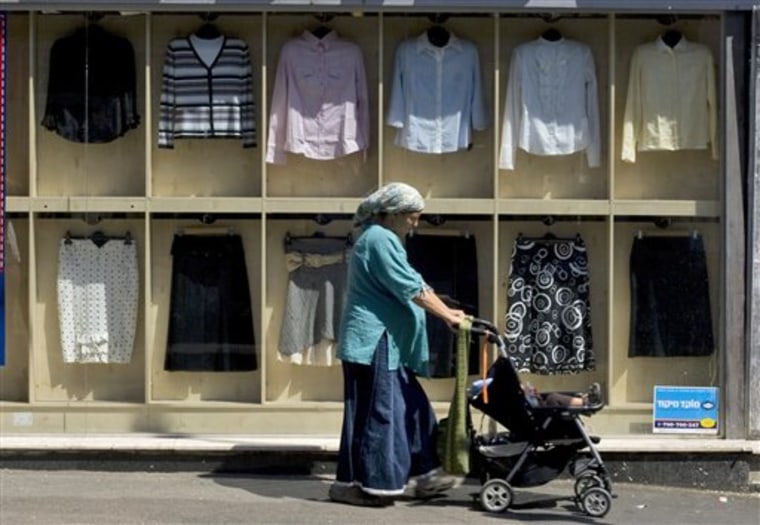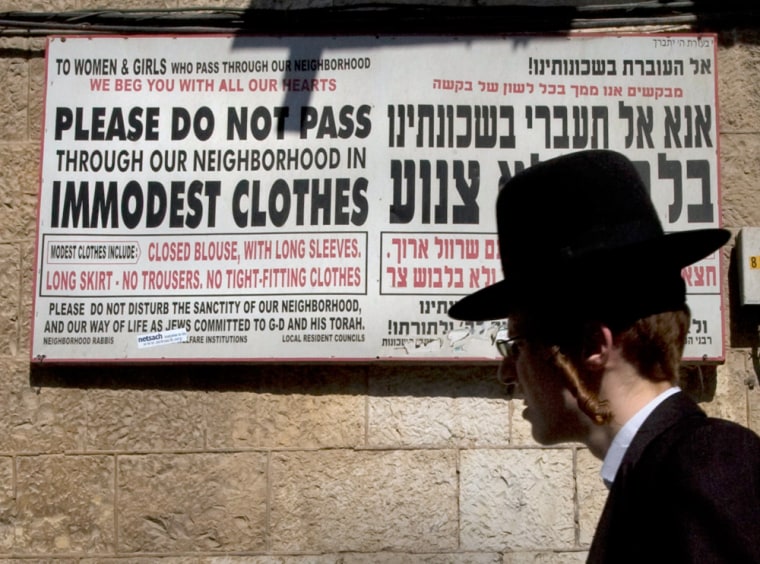In Israel's ultra-Orthodox Jewish community, where the rule of law sometimes takes a back seat to the rule of God, zealots are on a campaign to stamp out behavior they consider unchaste. They hurl stones at women for such "sins" as wearing a red blouse and attack stores selling devices that can access the Internet.
In recent weeks, self-styled "modesty patrols" have been accused of breaking into the apartment of a Jerusalem woman and beating her for allegedly consorting with men. They have torched a store that sells MP4 players, fearing devout Jews would use them to download pornography.
"These breaches of purity and modesty endanger our community," said 38-year-old Elchanan Blau, defending the bearded, black-robed zealots. "If it takes fire to get them to stop, then so be it."
Many ultra-Orthodox Jews are dismayed by the violence, but the enforcers often enjoy quiet approval from rabbis eager to protect their own reputations as guardians of the faith, community members say. And while some welcome anything that keeps secular culture out of their cloistered world, others feel terrorized, knowing that the mere perception of impropriety could ruin their lives.
"There are eyes and ears all over the place, very similar to what you hear about in countries like Iran," says Israeli-American novelist Naomi Ragen, an observant Jew who has chronicled the troubles that confront some women living in the ultra-Orthodox world.
The violence has already deepened the antagonism between the 600,000 haredim, or God-fearing, and the secular majority, which resents having religious rules dictated to them.
Religious vigilantes operate in a society that has granted their community influence well beyond its numbers — partly out of a commitment to revive the great centers of Jewish scholarship destroyed in the Holocaust, but also because the Orthodox are perennial king-makers in Israeli coalition politics.
Thus public transport is grounded for the Jewish Sabbath each Saturday, and the rabbis control all Jewish marriage and divorce in Israel.
In recent years, however, the haredim have eased up on their long campaign to impose their rules on secular areas, and nowadays many restaurants and suburban shopping centers are open on the Sabbath.
These days, most vigilante attacks take place in the zealots' own neighborhoods.
'They can burn in hell'
Israel police spokesman Micky Rosenfeld said the modesty police are not an organized phenomenon, just rogue enforcers carrying out isolated attacks. But Israel's Justice Ministry used the term "modesty patrols" in an indictment against a man accused of assaulting the Jerusalem woman.
The unidentified, 31-year-old woman had left the ultra-Orthodox fold after getting divorced, according to the indictment filed by the Jerusalem district attorney's office. The indictment said her assailant tried to get her to leave her apartment in a haredi neighborhood in Jerusalem by gagging, beating and threatening to kill her. He was paid $2,000 for the attack, it said.
A 17-year-old who moved to Israel from New York five years ago said she was hospitalized after being attacked with pepper spray by a crowd of men outraged that she was walking down a Jerusalem street with boys.
"They can burn in hell," said the girl, who would identify herself only as Rivka.
She lives in Beit Shemesh, a town outside Jerusalem where the vigilantism has been particularly violent. Zealots there have thrown rocks and spat at women, and set fire to trash bins to protest impiety. Walls of the neighborhood are plastered with signs exhorting women to dress modestly — spelled out as closed-necked, long-sleeved blouses and long skirts.
'Stupid troublemakers'
The state, catering to religious sensitivities, subsidizes gender-segregated bus routes that service religious neighborhoods. Ragen and several other women challenged the practice in Israel's Supreme Court after an Orthodox Canadian woman in her 50s told police she was kicked, slapped, pushed to the floor and spat upon by men for refusing to move to the back of the bus.
Another Beit Shemesh girl, who asked to be identified only as Esther, said zealots threw rocks, cursed and spat at a friend for wearing a red blouse — taboo because the color attracts attention.
Yitzhak Polack, a 50-year-old Jerusalem teacher, is one of those who deplore such behavior.
"They are stupid troublemakers who are bringing shame and disgrace on this holy community," he said.
But the rabbis are afraid to condemn them, says Yehuda Meshi-Zahav, another community member.
"They can't come out against zealots who champion modesty. Here and there they write against violence, but the militants ultimately set the tone," he said.
Stores are targeted too.
'This store burns souls'
In August, a Jerusalem man was placed under house arrest on suspicion he set fire to a store in a haredi district of the city that sold MP4 players.
"It started about six months ago. They would come into the store, about 15 of them at a time, screaming, 'This store burns souls!' and they would throw merchandise on the floor and threaten customers," said 31-year-old Aaron Gold, a haredi worker at the Space electronic store.

One Friday night, just before the Sabbath was about to begin, "they smashed a window, doused the place with gasoline and lit a match," Gold said.
Now, a big sign behind the counter says, "All products sold in this store are under rabbinical supervision. By order of the rabbis, no MP4s are sold here."
Clothing stores that sell clothes regarded as provocative have been vandalized, and bleach thrown at merchandise.
Suspicion sparks attack
Girls have been expelled from school after being seen talking to boys, a punishment that ruins their marriage prospects.
"It could be very innocent; she could be talking to her brother," Ragen said. But once thrown out of school, "no one — NO ONE — will take you in," she added.
In one case, the violence reached the highest levels of haredi society.
Three years ago, a son of Israel's Sephardi chief rabbi, Shlomo Amar, was accused of kidnapping a 17-year-old boy, beating him at knifepoint and terrorizing him with snarling dogs because he had sought the attentions of the accused's unchaperoned sister.
The son was sentenced to two years and eight months in jail.
His sister married a different suitor the following year.
